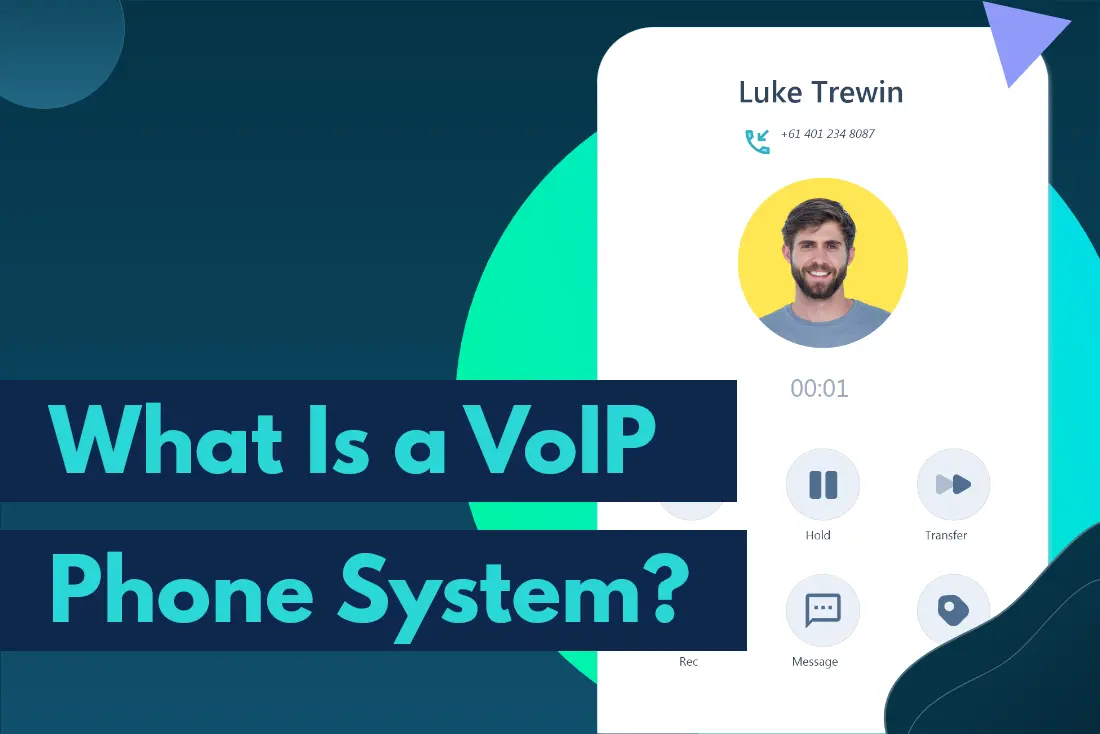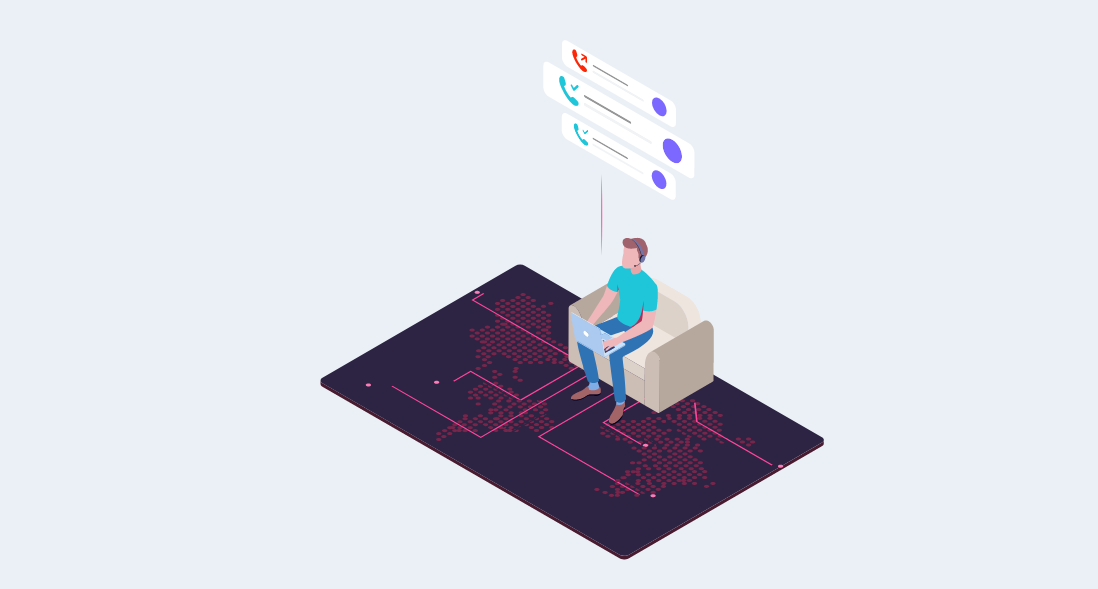What Is a VoIP Phone? Everything you need to know
Awesome Dial
Published on:
December 6 , 2023
·25 min read

The term Phone VoIP refers to Voice Over Internet Protocol. Over the internet, you can make phone calls using this technology. As a result, consumers and businesses have found this system to be the most convenient. Data is converted into phone calls by VOIP systems. VOIP systems use the internet to send data, so they are more cost-effective and economical than traditional telephone systems if you have good internet communication.
Computers and devices with internet connections can use VoIP solutions. This service provider doesn't just focus on establishing calls but on routing outgoing and incoming calls using existing telephone networks. Internet-based telecommunications, such as VoIP, use the internet to transmit data. To understand what Phone VoIP service is, let's review what traditional phone service is.
• The traditional phone system consists of hardware, such as a telephone and landline, a wired connection that allows one to make calls from one point to another. In the 20th century, there was no better option.
• We live in a fast-paced, data-driven age, which means that one can replace traditional phone systems with Phone VoIP systems, which offer numerous advantages over traditional phone systems.
• In VoIP phone USA calling service, calls are made and received over the internet. Considering the internet network's size, making international calls to your clients in Beijing from the USA is relatively inexpensive. You will save 30 times on international calls when you use a VoIP system instead of a landline-based PSTN system.

What is VoIP?
You can easily find a quality VoIP phone service from numerous companies which provide internet phone numbers for making calls. The only hardware you need to make these calls is a handset to list and a browser to access your service provider's web applications.
Some benefits of VoIP are:
• Global connectivity is improved
• The system is easy to set up
• Easily maintained
• All cloud-based technologies offer pay-per-use VoIP services, which is an important benefit.
A VoIP (Voice over Internet Protocol) connection uses the internet to allow voice calls rather than a regular phone line (or analog). Depending on your VoIP USA calling service, you may be limited to calling other users. Still, others may allow you to call any phone number, including local, long-distance, mobile, and international phone numbers.
There are several features that VoIP can provide. Many VoIP services provide features similar to those you would get with a regular phone, such as caller ID, call waiting, voicemail, and 3-way calling. Furthermore, many VoIP USA calling services allow you to view the caller's information on your computer screen, log your calls, record your calls, and block unwanted calls automatically using caller ID blocking.

Top VoIP features
You do get to enjoy multiple advantages when using the Phone VoIP system, including:
• Auto-attendant
Callers can be directed to the appropriate department or person using this feature. You can use this feature to forward calls to the concerned person, voicemail, or somewhere else when you are out of business hours.
• HD call quality
It is almost twice as easy to get HD quality sound with VoIP technology than traditional phone systems.
• Call encryption and VOIP security
There is a greater likelihood that telephone calls carry confidential information, such as credit card numbers, HR conversations, and other crucial information. When the system utilizes TLS and SRTP, it scrambles calls in VOIP phone systems, making them almost impossible for intruders to break through.
• Call recording
A VoIP phone system has call recording and call forwarding features, which are undetectable by other parties and do not require additional hardware.

How is VoIP Used?
Now that you know what VoIP is and how it can benefit you, it's time to look at how you can use it in your everyday life. Likely, you're already using VoIP each time you place a long-distance call. Many phone companies are using VoIP to streamline their networks.
Many businesses are now using VoIP to communicate with contacts worldwide, so technology is catching on. Phone VoIP is used not just by phone companies; more and more businesses are using it to communicate with contacts in other countries.
Building your VoIP system requires the following tools:
VoIP phones can convert digital data into audio signals. It is possible to convert VoIP phones into Traditional telephones by connecting them to analog telephone adapters as soon as the digital data has reached the target device or phone that data transfers over the public internet. With the help of Call center software and speakers, that device converts audio data into sound.
One can make VoIP calls over the internet, so certain requirements exist. Those requirements include a network connection for transmitting an audio signal into digital data.
You can make VoIP calls using devices other than phones provided those devices have microphones, speakers, and internet connections. As smartphones already have the necessary hardware, making VoIP calls is as simple as connecting to the internet and installing a softphone.
One can use a headset or integrated microphone with desktop computers and laptops to make calls. Adapters that convert traditional telephone calls to work over the internet can connect to traditional telephones. To install and configure a VoIP system, you should have the following basics ready:
• It is not possible to use VoIP over a dial-up connection - you will need a broadband (high-speed internet) connection.
• The internet offers several VoIP services, including Skype, Google Voice, and Vonage.
• An adapter for VoIP phones - This device converts your regular phone to a VoIP phone using your high-speed Internet connection.
• VoIP phones look like regular phones, but they use your internet connection in place of regular phone lines.
How does VOIP work?
Voice over Internet Protocol is also known as VoIP. It’s faster to transmit voice, data, and multimedia sessions via VoIP. This technology allows you to transmit your voice over the internet. VoIP works only if you have an active internet connection.
Through Phone VoIP, you can transform your voice and other audio output into digital signals, which can be transmitted directly from your home PC, VoIP phone devices and any other network device. This is extremely beneficial if you want to upgrade your telephone system.

The main benefit of a VoIP phone system is a substantial reduction in call costs and infrastructure requirements. With Voice over IP, you don't need to install additional phone lines since it relies on the internet. Furthermore, your phone system can sync contacts with other business apps, including Google Contacts, voicemail-to-email, CRM integration, and voicemail-to-email.
In place of the traditional public switched telephone network (PSTN), IP phones (or VoIP phones) make and receive calls over IP networks (the internet). It is very reliable to use IP phones because they use hardware acceleration to process phone calls.
The telecommunications app WhatsApp is an example of VoIP for domestic use. You can call other WhatsApp users and receive calls from them. Since the VoIP exchanges phone conversations between one system to another using data packets instead of voice, it is generally faster to communicate over the internet since it can communicate anywhere in the world in a matter of seconds. It is, therefore, a fast and reliable method of communication. It works like this:
• Local Area Network (LAN) connections happen made between your phone and your switch or router.
• Your IP will allow your VOIP USA calling the provider to contact another party when you dial a number.
• The VOIP will begin exchanging data packets once your IP phone establishes a call.
• You can then hear the sound generated by your VOIP signal.
VoIP (Voice over Internet Protocol) sends voice data signals through the internet. VoIP works in the same way as any other phone system except that instead of using physical cables to connect to a phone, it relies on an internet network connection to connect to the phone. WiFi, LTE, 4G, 5G, or similar networks are all you need. To make or receive a VoIP call, you need a device that can connect to the internet, such as a laptop, mobile device, IP phone, etc.
VoIP can deliver better call quality than analog phones because it uses the internet instead of analog circuit switching. As a result, there are minimal downtimes due to hardware-related issues.
• The technology that powers VoIP
Packet switching is an underlying data transmission technology that allows VoIP to work.
• What is packet switching?
Through packet switching, the voice message is divided into some data packets. Data packets are transmitted over the internet or through an IP network from the origin system to the destination system. You would send any other type of data daily, such as email, Slack messages, WhatsApp messages, etc.
The efficiency with which packet switching carries data to its destination differentiates it from normal data transmission. VoIP services identify the fastest and shortest network to send the data packets after breaking down the data into packets.
Upon dispatch, data packets are rearranged at the recipient's end into a voice message, which in VoIP is called a voice message. In a network where data packets move dispersedly, signal interception and message eavesdropping are almost impossible.
It is also possible to transact high-definition voice calls with an ordinary broadband connection, as the data packets range from a few kilobytes to several megabytes.
• The ingredients involved in a VoIP call
Several ingredients go into making a successful VoIP call get through.
• Internet-connected device
Smartphones, IP phones, VoIP phones, tablets, PCs, or even laptops with VoIP software can all be used.
• Internet connection
It is easier to connect the device to the Internet via WiFi or cable.
• VoIP service
Providers of VoIP phone systems - such as cloud-based applications or carriers of VoIP connections.
• PSTN
You can connect Analog devices to the public switched telephone network via this network. Even though VoIP uses the internet, devices connected to PSTN networks can also receive VoIP calls.
How Is VoIP Useful?
Generally speaking, long-distance phone calls are expensive, and you can expect a gross surprise when your monthly bill arrives at the end of the month if you stay on the line for more than a few minutes. A VoIP connection transforms a regular Internet connection into a free phone line. Using the internet instead of the phone company, you can bypass their inflated charges and make phone calls.
A wealth of free Phone VoIP software options is available online if you want to try VoIP. After downloading them and getting a friend to do the same, you'll be able to make calls and get a taste of VoIP in a few minutes.
As well as being called Voice over IP, VoIP, as well as VoIP over Internet Protocol, is essentially a technology that allows users to use broadband Internet connections to place voice calls instead of using conventional telephone lines. Both standard telephone lines and VoIP calls follow similar steps, such as signaling, digitizing analog voice signals, encoding, and setting up channels. Still, the standard phone line uses a circuit-switched network, while VoIP USA calling uses a packet-switched network. As a technology, VoIP has proven to be highly effective during the past decade.
VoIP is most attractive because of its low cost. Businesses can cut their communication costs significantly by using it. VoIP isn't just attractive for personal use because of the price; it is also an enjoyable communication method through computers and mobile devices. Among the first VoIP applications was Skype, which allowed users to instantly send messages and make voice and video calls to others worldwide.
In comparison with a traditional phone system, VoIP typically offers better bandwidth efficiency and lower costs. The size of a company determines what packages global communications companies offer to compete with VoIP providers. United World Telecom, for example, offers a single network that can facilitate voice and data communication. Having the ability to do this drastically reduces infrastructure costs.
It costs much less to add extensions to VoIP systems than to add extensions to hardware-based Private Branch Exchange systems. A VoIP system also has the advantage of being more user-friendly than a Private Branch Exchange. It is simple to set up and use the system initially and regularly.
In addition, the system allows mobile use at all times and allows conferencing, dialing, and music for callers to listen to while waiting. Additional benefits include the ability to have someone answer calls virtually. Further enhancement of the flexibility and attractiveness of VoIP is possible by using it with local or toll-free numbers, conference call extensions, and virtual fax extensions.
Local calls versus long-distance calls: what's the difference?
It is not uncommon for VoIP providers to offer free calls to other subscribers of the service, but normally only to subscribers of the same service. Depending on your VoIP provider, you may have the option to select a different area code than the one in which you live. Also, depending on their area code and service, people who call you may incur long-distance charges.
VoIP providers may charge a long-distance fee for calls outside your calling area, just like traditional wired telephone service. Other Phone VoIP providers allow you to make unlimited long-distance calls for a flat rate.
How do I make a VoIP call if I have a VoIP service?
There may be a limit to what you can call, depending on the service you choose, such as other subscribers, or you may be able to call anyone with a telephone number - including local, long-distance, mobile, and international. People with analog phones do not require special equipment to talk to you if they have regular analog phones. Some VoIP services allow you to speak with more than one person.
Advantages of VOIP systems
• Cost-effectiveness is its main advantage. As a result of VoIP, businesses, and consumers have noticed a 60% reduction in phone bill expenses.
• Unlike traditional phone systems, these systems don't silence or muffle the sound.
• According to the service provider you choose, it includes advanced features such as auto-attendants, call recording, and call queues. Plans for business phone service usually include these features.
● The cost of international and long-distance calls is also relatively low.
Disadvantages of VOIP
• For VOIP to work effectively, an internet connection with a high speed (at least 100kbps) is required.
• During certain emergencies, such as calling 911, you must provide the operator with your exact location.
• Due to the lack of analog signals in phone VoIP, analog phones have become obsolete.
Why is VoIP used?
Today, you will probably see VoIP connections in all business IT centers. Voice over IP makes communication with local and international clients easier with mobile apps, desk phones, and softphones. Among the most popular names are Skype, Google Hangout, Vonage, and Ring Central, making it easier for clients to make unlimited calls to the USA.
Creating conference calls, voicemails, auto-answering, and monitoring call history are the basic features of VoIP for businesses. VoIP connection is recommended for all businesses to experience the high-end technology features for office infrastructure to grow faster. Here at VoIP Office, we provide business communication platforms that allow seamless integration of phones and CRM platforms for uninterrupted calls.
• Cost savings
VoIP is most attractive because of the cost saving probability that this technology has. The cost of long-distance phone calls decreases when switching over from public switched telephone networks. Voice traffic is transmitted over internet broadband connections or through private data networks instead of conventional commercial telecommunications lines.
• Richer media processing services
Although limited video service is available, the legacy phone system primarily provides voice and fax services. As reflected in today's rich media communications over the internet, the demand of users is much higher than that. Checking in on friends' status (online, offline, busy), sending instant messages, making video or voice calls using a single system, transferring images, etc.
As VoIP technology integrates with other protocols and applications, better media services become possible. In addition to providing users with multiple media options, creating new markets within the communications industry, such as VoIP services in mobile phones.
• Phone portability
Legacy phone systems assign a phone number with a dedicated line, so you cannot move your home phone to a different location if you wish to keep the identical number. Changing a phone number when moving to a new house can be a hassle and a time-consuming task. If you have a phone device and IP connectivity, VoIP offers number mobility: you can use the number you already have almost anywhere. Today, many business people use this type of system based on a single number wherever they go, even when using IP phones and soft phones.
• Service mobility
It is important to note that service mobility comes in the framework of mobility here. The same features are available wherever the phone goes, including the voicemail access, call features, security features, service policies, and call logs.
Voice-over IP is managed, processed, and decentralized by a service provider. Instead of all calls flowing into one machine on-premise, one routes them to any of the data centers supported by the provider. When using copper landlines, all phone numbers are assigned to the line. New phones will ring using the same old-phone number when plugged into that line. That information is stored in the registration whenever a phone or softphone connects to the network.
It is possible to take a VoIP phone and plug it into a new location, which will ring the same phone number. VoIP providers have been able to help companies transition to remote working quickly during the COVID-19 pandemic and its emergency response.
With their phones plugged into the internet, agents can take calls from home just like they were sitting at their desks at work. You can even use a VoIP system to link a computer or a mobile phone with a softphone application, removing the need to be at the office to take business calls.
• Other applications can be integrated and collaborated with
A VoIP protocol (such as the SIP or Session Initiation Protocal, H.323) runs on the application layer. It integrates or collaborates with another application, such as an email client, a web browser, an instant messaging program, a social networking application, etc.
Real synergies are created by integrating and collaborating, and valuable services are provided to users. There are many examples of this, including delivery of your voicemail via email, a click-to-call button located on most websites today, contact availability notifications etc.
• User control interfaces
Normally, VoIP service providers provide their customers with a web-based control interface that enables them to change their features, services and options with ease. As an example, users can login into the web GUI and customize the call forwarding numbers, contact presence updates, speed dial, music-hold option, blocklist/allowlist, or anonymous call blocking.
• Geographical boundaries are unlimited
VoIP services areas become virtualized; meaning there are no geographical boundaries. There is no specific location associated with the area code or country code. It is possible, for example, for someone living in South Korea but utilizing a US phone number to make domestic calls (cheaper) to the US.
• Rich features
In addition to click to call capabilities, VoIP offers advanced features such as selective call forwarding, custom ring tones, Find-Me-Follow-Me, simultaneous ring tones on multiple devices, and selective area codes. The next section explores some of the disadvantages after getting to know what all the benefits are.
• Low Cost
There are many differences between making a call with old telephony and making a call with VoIP. Using the internet to make a call costs very little. If we make the same call using our old telephone line, it will cost more and take more time to connect, in addition to having a lot of jitters.
Switching from a landline to VoIP saves businesses money on average. As a result of utilizing existing infrastructure, it is less expensive to maintain hardware and software. Hosting VoIP providers manage calls using their hardware, and they handle maintenance and patching for all their clients because it needs to be done centrally. It may look like some landline offers are cheap, but maintenance and support are separate costs.
Business needs to build internet infrastructure to compete in our modern economy, and infrastructure has its costs. The cost of building or upgrading copper telephone lines in buildings, on or more if a business has more than one location, can add up quickly.
• Flexibility
It is very flexible when it comes to using it. All you need is to register for a VoIP application and make the call. It's also relatively easy to add or remove the new user from the VoIP phone system regardless of where they are. Other than these benefits and call analytics, VoIP phone systems provide smart call forwarding and other modern telecommunication features that convince any new user to choose them.
• Hardware that is minimally dependent on clunky
A laptop or internet-connected device is all you need to use VoIP since it works primarily over the internet. The user does not need to worry about hardware installation or maintenance like traditional hard phones.
• Technically advanced
Most VoIP providers now offer mobile apps for Android and iOS devices. Mobile devices can be used as VoIP handsets when you download these apps. By doing so, you can access all of your VoIP service's features directly from your mobile device. Compared with traditional landlines, mobile phones offer a great deal of mobility and portability.
• Scalability
The internet availability in an area entirely determines VoIP's scale. The addition of phone numbers, lines of service, users, and locations go through a web portal in just a few clicks. You can call to add lines if you already have the hardware, and they get set up the same day. You can do it in as little as 30 minutes, depending on your savvy and your number of users.
A traditional telephony company cannot match the ability to expand and ramp up its workforce aggressively. Even though infrastructure upgrades can be expensive and time-consuming, you don't need to run new cables.
VoIP allows you to serve multiple locations at the same time. You can manage each location separately, yet extension dialing is available between them. To grow as a business, an efficient communication system is necessary.
• Functionality
One can easily transfer numbers between users or within a call flow if that is your preference. If you own a small business with five employees, your main phone number will ring directly to your receptionist, who will handle inquiries and transfer calls. A medium-sized business can forward that phone number to a group of receptionists whose phones ring simultaneously or to an automated attendant. With a few clicks, you complete this transition. Reorganizing with VoIP is smooth and downtime-free.
• Take Calls from Anywhere
You have to sit by landline phones to receive calls, which is one of the biggest problems. It's time to end this problem. The virtual phone system is what you need to solve this problem. With a good internet connection, you can access calls anytime and anywhere, even using multiple devices with the same calling account.
In the past, people received additional money to notify you of any phone calls. In the future, you can manage the system all on your own using your phone. You will now be able to be connected to any call when needed. You can make calls whenever and wherever you like, and they will reach you instantly.
• Directing Calls
The ability to direct calls is very handy in an environment with multiple incoming calls. It is very useful, but landlines and cell phones make it difficult to direct calls, particularly when receiving multiple calls simultaneously. It is either necessary to drop a call or put it on hold.
With cloud-based virtual phone systems, you can easily direct calls however you want, thanks to advanced features like call forwarding. If you run a business, you don't want any client left unattended, so this is the ideal system for you. Calls can be directed from one device to another with just a few taps, ensuring that all customers are properly taken care of.
By synchronizing forwarding schedules with business hours, you can ensure that they are synchronized with the availability of your agents. You won't have to chase down missed calls or worry about them. Directing them is all you need to do.
• No Missed Calls
Isn't it time you stopped blaming your employees for missing calls? They may be unaware of its negative effects on your business. To grow, new businesses must capitalize on every single call, and even missing one can have catastrophic consequences. A virtual phone system would eliminate these issues in a heartbeat, and they would no longer have to worry about missed calls. Many businesses struggle to deal with floods of incoming calls, and most of them go unanswered. A virtual phone system allows businesses to handle all of these calls efficiently.
• Value-added Features
There are several advantages to using virtual phone systems over traditional ones, like parallel ringing, call reading and advanced call forwarding. Implementing these features can help your business outperform your competition.
• Track Your Marketing
Keeping your marketing dilemma under control is also possible with virtual numbers. You can track the effectiveness of your marketing ventures and make data-driven decisions. The marketing aspect of your business can be effectively handled by connecting PBXPlus with other applications such as Salesforce, AgileCRM, and REST API.
• Quality
More businesses are moving to VoIP, so copper phone lines are becoming less profitable. Even ISPs who used to champion copper are now moving most of their new plans to "digital voice, " meaning they normally send phone service over the same internet connection they provide. Two lines are not necessary."
Without money, less time, effort, and (of course) money will be needed to repair and lay down new copper lines that aren't internet lines for people who don't have an option with their ISPs.
Businesses with landline systems, for example, will notice that over time, their copper starts degrading for years, and repairing it is expensive. Thus, switching to VoIP is better than ditching the landline provider.
VoIP can support HD-Voice, which uses some High Definition Audio Codecs to transmit audio. It is possible to have a clear VoIP-to-VoIP conversation even if you are hundreds of miles away if you have a strong internet connection.
Does the FCC regulate VoIP?
Interconnected VoIP services are VoIP services that allow users to make and receive calls from the regular telephone network and are subject to 911 requirements imposed by the FCC in June 2005. Nevertheless, 911 calls made using VoIP are handled differently from those made using regular telephone service. Refer to our consumer fact sheet to learn more about the differences between VoIP and 911 services.
Aside from compliance with CALEA (Communication Assistance for Law Enforcement Act of 1994), interconnected VoIP providers do contribute to the Universal Service Fund, which provides communications services for low-income telephone subscribers in high-cost areas.
Types of VoIP Communication
These three types of VoIP services will enhance your communication experience.
• Computer-to-Computer
• Computer-to-Phone
• Phone-to-Phone
With VoIP services, businesses have more options and variety than ever before. With it, you can make calls from anywhere, provided you have an internet connection. It allows your business to communicate the way it wants. As we now connect with others on various levels through the internet, it has become more than a place where we search for information. Using VoIP for business is a new way of doing things.

What is VoIP in business?
VoIP means ‘Voice over Internet Protocol,' a technology where users can make and receive phone calls. As broadband has become more widely available, VoIP has become the preferred option for consumers and businesses. VoIP is often considered an alternative to local phone companies.
It's not that new to use VoIP. Since the late 1990s, phone calls have been carried over digital lines. With VoIP, you can handle unlimited calls at a low cost. In many businesses, phone service happens through specialized hardware. You need Private Branch Exchange (PBX) equipment for this purpose.
The public telephone network connects to internal phone extensions. Setting up and maintaining a PBX is generally quite high. A trusted VoIP provider can handle everything. Your IP phone is ready to use once you plug it in. Your high-speed internet connection helps establish connectivity with these digital phones.
• Managing autonomous projects easier
Private and business customers can use VoIP internet communication solutions provided by a voice-over-Internet Protocol (VoIP) specialist; alternatively, a VoIP phone specialist cooperative. Typically, VoIP equipment comes from a VoIP specialist cooperative. In addition, they provide services monthly to endorsers even though facilitated VoIP administrations are quite common.
VoIP service provider specialist organizations use parcel-changed communication to send messages over the Web instead of the circuit-exchanged communication of the Public Exchanged Telephone Network (PSTN). A VoIP call is similar to a regular phone call. These calls are made rather than over a regular phone line but over a broadband connection.
• Small and medium-sized businesses can benefit from VoIP
With the best VoIP service provider, Call center software solutions, and Internet Telephony Service Provider choices, dealing with the framework can be simplified, particularly when adding new clients. Additionally, online interfaces simplify the process of adding and moving items. Changes to framework setups are also more straightforward and useful.
• Clients benefit from its adaptability and portability
You can coordinate various software frameworks with the best VoIP service. For example, you can use remote conferencing, document sharing, and email. It can be an extraordinary resource since it allows your clients to adapt to your business.
Clients who are constantly on the go- especially the corporate staff who travel frequently- will find this adaptability and versatility greatly beneficial. Furthermore, VoIP offers significantly lower rates than traditional landlines and phone lines for long-distance calls. Furthermore, it saves you a lot of money.
• You can reduce overall organizational costs by using it
It can be extremely costly to setup standard lines inside an office. However, setting up and managing VoIP features are not nearly as expensive. The following is a list of budget-friendly VoIP alternatives to Skype.
Additionally, there is generally no problem with making calls between two laptops over the internet. Communication between different associates is implied here. By utilizing your VoIP administration, you won't have to spend any money on offices. It is still possible to incur charges for calls from a PC to a landline. Cellular and landline phone rates are lower, however.
• Scaling tends to be based on demand
A business has difficulty deciding how many phone lines it needs, especially when multiple locations exist. Making new offices, adding faculty, or expanding your workplace is something you must constantly ensure—state-of-the-art interchanges framework.
• As a result, SMEs will be able to compete with more excellent organizations
To compete effectively with more significant, more established organizations, there are many things an organization must do. In addition, having an effective and practical correspondence system is essential. VoIP Service Providers in your area that provide useful services empower clients to manage inward.
Also, you can manage outside correspondences more savvily and pragmatically. Small and medium-sized businesses will want to speak with prospective customers in the following sequence at no monetary expense and communicate with partners—finally, customers across long distances and competitors around the globe.
• Enhances the usefulness of staff
Business VoIP solutions provider innovation can maximize the efficiency of everyone in your organization, from leaders to directors. Clients will be able to participate in virtual meetings through your VoIP framework. At very little expense, organize worldwide phone meetings and add to the organization's record. In addition, you can use video conferencing to provide critical information.
Over the past few years, VoIP service providers have made significant progress in terms of innovation; especially regarding voice transparency, which has become practically vague from more conventional phone conversations. It was common for VoIP to cause distorted phone calls, dropped calls, and sluggish transmissions in its primary forms. However, this is no longer the case.
• It accompanied broad add a scope of call highlights
Incorporated has expected a lot of calls from conventional telephone lines. In addition to these features, facilitated Voice over Internet Protocol frameworks is available. These features include call moving, holding, sending, chasing, auto-orderly phone menus, and gathering calls. From there, it's all downhill. In any case, you will not lose anything.
What is the best VoIP phone system for independent projects?
One can reduce telephone costs by around 60% when using the VoIP phone provider framework Australia, which is gaining popularity step by step. Business needs should be taken into consideration when choosing a plan. In addition, you can make modest significant distance calls nearby or globally using VoIP-enabled mobile phones.
The most effective way to get an IP PBX is to use a facilitated provider since they limit the expenditure on the equipment. It would have generally been necessary to do that, resulting in immense costs. Providers of IP phones and specialist cooperatives should offer lifetime programming agreements free.
What are VoIP services?
Voice over internet protocol (VoIP) Call center software uses an IP network to transmit calls seamlessly without needing a second telephone line. Modern private telephone networks within organizations are called PBXs (private box exchanges or private branch exchanges).
• Nextiva
• Aircall
• Zoiper
• Skype
• Google Hangouts
• Viber
• Facebook Messenger
• Google Voice
What makes the best VOIP service providers different?
Depending on what you want, you may need a hosted VoIP alternative for an ITSP, carrier, office, or developer looking to integrate with a telephony platform. You'd Call forwarding based on rules
• Drag-and-drop web interface for easy management
• Ring groups
• A voice from the auto attendant says, "You've reached Mike's Bike Shop. Press 1 to reach Sales."
• Sending and receiving faxes
• Using a conference call
What are VoIP Providers?
By utilizing an IP network, voice over internet protocol (VoIP) Call center software transmits phone calls seamlessly without the need to connect to an additional telephone network. Private branch exchanges (PBXs) are modern forms of PBXs (private box exchanges), private telephone networks within organizations. VoIP providers, such as hosted PBXs, virtual PBXs, and cloud PBXs, offer different PBX types. In general, the differences between these options come down to how much maintenance is required by the user.
There are a variety of hardware requirements associated with VoIP solutions; some companies require clients to use their proprietary VoIP phone systems, while others allow the use of any IP-based phone. Softphones are similar to PBXs, but they allow users to make calls using their cell phone instead of or in addition to a traditional PBX.
The VoIP feature is present in other types of communication Call center software. In video conferencing software, VoIP is the better option for voice communication. While VoIP providers do not require video messaging services or the use of other outlets, they offer internet-based call connectivity. In UCaaS and contact center Call center software infrastructures, VoIP is a mainstay. In many UCaaS solutions, you can get both softphones and PBXs.
To qualify for inclusion in the VoIP category, a product must:
• Provide VoIP PBX systems for businesses and offer VoIP softphones
• Also, provide hardware, if necessary, for a solution
• Provide features that assist in regulating incoming calls
Type of VoIP services
In-house VoIP Systems
Businesses of all sizes can use them, from the very large to the very small. Businesses, large and small, use VoIP PBX systems to replace old POTS phone systems. Small businesses can use VoIP PBX systems hosted on a dedicated desktop computer to achieve the same result.
First and foremost, there is the PBX itself. Landline connections to your existing service provider, a Telco, will be terminated and replaced by internet connections. An existing Internet connection is routed through a dedicated or existing network.
It is important to note that some devices, including fax machines, legacy modems, and alarm systems, are not digitally capable, so the existing analog connection to the old PBX must be transferred to the new VoIP PBX as a non-digital connection. Another option is to upgrade the device's Call center software, but that isn't always possible.
• Handsets
Ensure the replacement of current landline handsets with digital handsets that support VoIP. VoIP handsets may be compatible with some existing handsets. It is worth noting that VoIP handsets that are capable of supporting the extended features of the new VoIP system are much better for the new system.
• Mobile users
With SIP technology, smart devices such as smartphones and tablets can function as telephone extensions, making them ideal for larger sites where people always want to stay in touch. A WiFi network is necessary for mobile users to maintain a continuous connection to the PBX. A SIP app for the smart device requires installation on the new VoIP PBX and SIP Call center software on the new VoIP PBX.
Hosted VoIP systems
When businesses do not want to incur the capital expenditures of purchasing an in-house VoIP system or hiring the staff to support it, they can use a hosted VoIP service, which converts capital expenditures into operating expenses. Providers often lease out VoIP systems by hosting companies through financial institutions, providing the convenience of a periodic fixed cost.
In this case, the VoIP system can be hosted at the hosting organization's premises and connected to the host company by a telecommunications line. This scenario poses a big problem for voice communications because if the link goes down, all communications cease. It is possible to install an interface in the company that will enable internal calls to continue if the link goes down.
In a hosting environment, the equipment will be the same as what you would install in an in-house system. You will still need to install VoIP handsets and ensure that your network supports VoIP. It is also possible to install an in-house system and outsource its supply, operation, and management to a hosting company.
Hybrid systems
Some companies may continue to use both VoIP and their existing non-VoIP systems to take advantage of VoIP's functional and cost advantages. One can expect the hybrid system users to migrate to a full VoIP system eventually. This migration is more likely to be an in-house system for larger companies. The choice will depend on the cost and operational constraints.
Awesome Dial: A powerful VoIP phone system
A VoIP number functions similarly to a traditional phone number, except that your calls are controlled over the internet. This gives you additional freedom, consistent call quality, integrations, and other benefits.
Are you ready to ditch your antiquated traditional phone systems and start using VoIP?
Begin comparing VoIP plans to locate the one that best meets your requirements. You may quickly set up your first VoIP number during the account creation procedure. If you want to try Awesome Dial, one of the most economical and dependable VoIP services on the market, sign up for a free trial today and discover the power of an internet phone.
